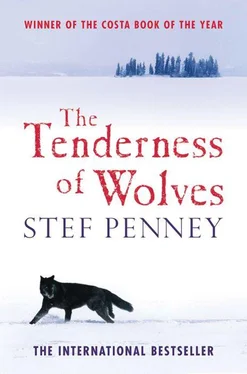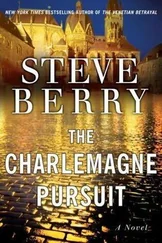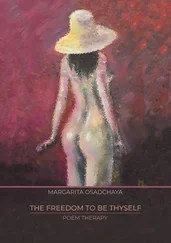Stewart’s eyes are haunted, as though he can see them still. Donald feels a surge of sympathy. God knows, he can imagine the strain of one endless winter after another.
Mrs Ross looks at Parker, and then back at Stewart. Almost as though Donald is not there.
‘Who is Half Man?’
Stewart smiles a pained smile. ‘Ah. There you see …’ He looks up, this time directly at Mrs Ross. ‘Half Man is another unfortunate. A regular drunk. He is Norah’s husband, so we give him food now and again. He is a trapper, but not a very useful one.’
There is a nakedness about his face that make Donald uncomfortable. What right have they to force this man to reveal his troubles?
‘I must apologise again for deceiving you. One wants to be thought–especially in a Company like this …’ He glances at Donald again, which makes Donald drop his eyes in embarrassment. ‘One wants to be thought of as a good leader, a father, in some ways, to those under one’s responsibility. I have not been a good father to these people. It has been difficult, but that is no excuse.’
Mrs Ross is leaning back in her chair, a confused, distant look on her face. Parker’s is obscure, in his own shadow. Donald breaks in.
‘It happens everywhere. There is drunkenness, and there is madness. It does not reflect on your leadership that some men go astray.’
Stewart bows his head. ‘You are kind to say that, but it is not so. Anyway, what concerns you now is the man you followed … I assume because of something he did. Some … crime?’
Donald nods. ‘We will need to find him and question him, no matter what state he is in.’
‘I don’t know exactly where he is, but we could probably find him. But if you are looking for a criminal, you will not find one. He does not know what he does.’
While Stewart is speaking, Parker takes pipe and tobacco out of his pocket. As he does so, a scrap of paper falls onto the floor between his chair and Stewart’s. Parker does not notice, teasing strands of tobacco out of the pouch and firming them into the bowl. Stewart sees it and bends down to pick it up. He pauses fractionally with his hand on the floor, then hands it back to Parker, all without looking at his face.
‘I will arrange for a couple of the men to search for him. They should be able to follow his tracks.’
Parker puts the fragment of paper back in his pocket with barely a break in the ritual of filling the bowl. The whole incident has taken perhaps three seconds. The two men have sat side by side during the whole conversation without exchanging so much as a glance.
Near the end of the corridor, Parker turns to me. ‘I am going to get ready.’
‘You are going?’
I assumed his questions were answered. Foolish of me; of course he would not believe anything Stewart said.
‘He never said he did not send Nepapanees to Dove River.’
His certainty irritates me, so I do not reply. He is looking at me with that peculiar blank intensity of his, which speaks of great concentration while giving no clue as to its subject, or even its tenor. But it is only the habitual lines of his face that make you assume anger and violence are behind it; now I know that it is not so. Or perhaps I have lulled myself into a false sense of security.
‘You still have the shirt from Elbow Ridge?’
‘Of course I have. It is rolled at the bottom of my bag, underneath my fur-lined coat.’
‘Fetch it.’
Halfway across the open ground behind the stores, the sun breaks through a gap in the cloud. A shaft of light, solid as a staircase, strikes the plain beyond the palisade, illuminating a stand of scrub willow, skeined with snow and glittering with icicles. Its brightness is piercing; its whiteness hurts the eyes. As suddenly as a smile, the sun causes beauty to break out on this sullen plain. Beyond a range of a hundred yards, all imperfections are hidden. Beyond the palisade lies a perfect landscape like a sculpture carved in salt, crystalline and pure. Meanwhile we trudge through roiled slush and dirt, trampled and stained with the effluent of dogs.
The widow is in her hut with one of her sons, a solemn-looking boy of about eight. She is boiling meat over the fire, squatting beside it. She looks, to my eye, thinner and more ragged than when I last saw her, and somehow more native, although with her fine features she is, of all of them, the most clearly a half-breed.
She looks up without expression as Parker enters without knocking and says something I don’t catch. She replies in another language. My reaction to this–a sudden and violent jealousy–takes my breath away.
‘Sit down,’ she says listlessly.
We do so, on the blankets round the fire. The boy stares at me steadily–winter petticoats do not make sitting on the floor an elegant task, but I do my best. Parker starts in a roundabout way, asking about the children and giving his condolences, to which I murmur agreement. Eventually he gets to the point.
‘Did your husband ever talk about the Norwegians’ furs?’
Elizabeth looks at him, then at me. It seems to raise no recognition in her.
‘No. He did not tell me everything.’
‘And the last trip he made–what was the purpose of it?’
‘Stewart wanted to hunt. He usually took my husband with him, because he was the best tracker.’ There is a quiet pride in her voice.
‘Mrs Bird, I am sorry to ask you this, but was your husband ill?’
‘Ill?’ She looks up sharply. ‘My husband was never ill. He was as strong as a horse. Who is saying that? Is that what Stewart says, huh? Is that why he walked on ice he would never have walked on?’
‘He says he was sick and did not know his own children.’ Parker keeps his voice low, not wanting to include the boy. Elizabeth’s face literally contorts with feeling–disgust, or contempt, or rage or all of them–and she leans forward, her face a livid orange from the fire.
‘That is a wicked lie! He was always the best of fathers.’ There is something frightening about her; hard and implacable but also, it seems to me, true.
‘When was the last time you saw your husband?’
‘Nine days ago, when he left with Stewart.’
‘And when was the last time he had been away before that?’
‘The summer. The last voyage they made was to Cedar Lake at the end of the season.’
‘He was here October, the beginning of November?’
‘Yes. All the time. Why are you asking this?’
I look at Parker. There is just one more thing left to do.
‘Mrs Bird, I apologise for asking this, but have you one of your husband’s shirts? We would like to look at it.’
She glares at Parker as if this is insurmountable insolence. Nevertheless, she gets up with a jerky movement and goes to the back of the hut, behind a curtain.
She comes back with a blue shirt folded in her hand. Parker takes it and unfolds it, spreading it out on the floor. I take out the dirty roll, wrapped in calico; I spread it out, stiff and fouled, the dark stains giving off a rank odour. The boy watches us solemnly. Elizabeth stands with her arms folded, looking down on us with hard, angry eyes.
Instantly I see that the clean shirt is smaller than the other. It seems incontrovertible to say that they could not belong to the same man.
‘Thank you Mrs Bird.’ Parker hands her back her husband’s shirt.
‘It’s no good to me. There is no one to wear it now.’ She keeps her arms folded. ‘You wanted it, you keep it.’
There is an unpleasant twist to her mouth. Parker is disconcerted. It’s a novel and refreshing experience for me–seeing him not know what to do.
I speak for the first time. ‘Thank you, Mrs Bird. I’m sorry we had to ask you, but you have helped greatly. You have proved that what Stewart says is a lie.’
Читать дальше












